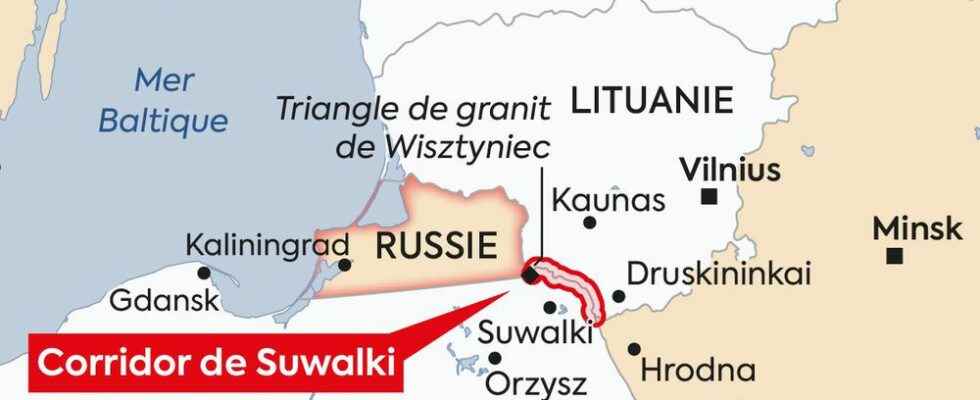Rise of fever between Moscow and Vilnius. Russia is furious after Lithuania’s decision to impose restrictions on the transit by rail of certain Russian goods – targeted by European sanctions – to the Russian exclave of Kaliningrad, on the shores of the Baltic Sea.
“Russia will respond to such hostile actions. Measures are being worked out in an inter-ministerial format and will be taken in the near future. Their consequences will have a serious negative impact on the Lithuanian population,” the Secretary of State warned on Tuesday. Russian Security Council, Nikolai Patrushev, during a site visit. The governor of the region, Anton Alikhanov, had previously estimated that 40 to 50% of his supplies were now targeted by this “blockade”.
Heavily militarized, the exclave of Kaliningrad hosts the headquarters of the Russian fleet in the Baltic Sea. With a population of around one million, it is strategically located between Poland and Lithuania, two NATO member countries. In the already explosive context of the war in Ukraine, should we fear a new powder keg in the heart of Europe?
A scenario gives cold sweats to the Baltic countries: that of a Russian attack on the corridor of Suwalki. This strip of land of about 80 kilometers, bordered to the east by Belarus and to the west by Kaliningrad, is the only passage linking Poland to Lithuania. A Russian offensive on this thin territory would allow it to quickly cut off any land connection between the Baltic countries and their NATO allies, complicating any military assistance in the event of a conflict.
Infographics
Dario Ingiusto / L’Express
“We cannot exclude any scenario”
Should we fear an action of this type from Moscow? “No scenario can be ruled out,” said Olevs Nikers, president of the Baltic Security Foundation in Riga, Latvia. “However, the possibility of a Russian military response remains the least likely because of its risks for Russia in a context where it is already in difficulty in Ukraine.” A caution shared by Thibault Fouillet, researcher at the Foundation for Strategic Research. “Unlike Ukraine, Lithuania is part of NATO and the European Union. Russian military action would lead to a general escalation with a mobilization of alliances, notes the specialist in the Baltic countries. Economic or Diplomatics, or even a show of force with the overflight of Lithuanian airspace by a Russian plane, seem to me much more likely.”
Faced with verbal threats from Moscow, the reaction of the Western camp was not long in coming. On Monday, the head of European diplomacy Josep Borrell cleared the ground by saying that “Lithuania has not adopted any unilateral or national restrictions”, but that it was only “applying EU sanctions”. The next day, the spokesman for American diplomacy, Ned Price, for his part reaffirmed his support for Vilnius, taking care to recall the “ironclad” attachment of the United States to Article 5 of NATO. , which provides “that an attack on an allied country is an attack on all”.
“Putin seeks to intimidate the Baltic countries”
Since the beginning of the Russian invasion of Ukraine, Lithuania has in any case shown itself as one of kyiv’s most fervent supporters. Beyond its regular arms deliveries – initiated before the Russian offensive of February 24 – Lithuania was the first European country to announce that it was ending its imports of Russian gas, from April 2, before being joined in stride by Estonia and Latvia. Two days later, Vilnius also decided to expel the Russian ambassador in response to “war crimes and crimes against humanity” committed by Putin’s army in Ukraine.
“Putin has always sought to intimidate the Baltic countries through aggressive rhetoric, points out Emilija Pundziute-Gallois, researcher at Vytautas-Magnus University in Kaunas, Lithuania, and associate doctor at the Center for International Research (Ceri) of Sciences po Paris. It is also, for him, a way to attack the EU through a link that he considers exposed and vulnerable.”
Estonian soldiers take part in military exercises with French and British NATO soldiers on February 6, 2022 near Rakvere, in the Tapa region.
afp.com/ALAIN JOCARD
In parallel, Estonia on Wednesday denounced provocative actions by Russia. The Estonian Foreign Ministry said it had summoned the Russian ambassador the day before to protest against the “totally unacceptable” violation of its airspace by Moscow on June 18. “The violation took place in southeastern Estonia, near the Koidula checkpoint, where a Russian helicopter entered Estonian airspace without permission,” a statement from the ministry said.
A sign of the ambient tension a few days before the NATO summit on June 28 in Madrid, the three Baltic countries have repeatedly called for a reinforcement of the Allied military presence in the region, asking for the installation of permanent bases of the Atlantic Alliance on their soil and no longer just rotational forces. Lithuanian President Gitanas Nausèda indicated on Thursday his intention to increase his country’s military spending to 3% of GDP “in the years to come”, in order to have the capacity to accommodate a larger number of soldiers from the NATO. “The invasion of Georgia by Russia in 2008 and the annexation of Crimea in 2014 had already largely awakened the fear of the Baltic countries to be the next on the list of Moscow, traces Emilija Pundziute-Gallois. The war in Ukraine, since February, has only strengthened it.”
